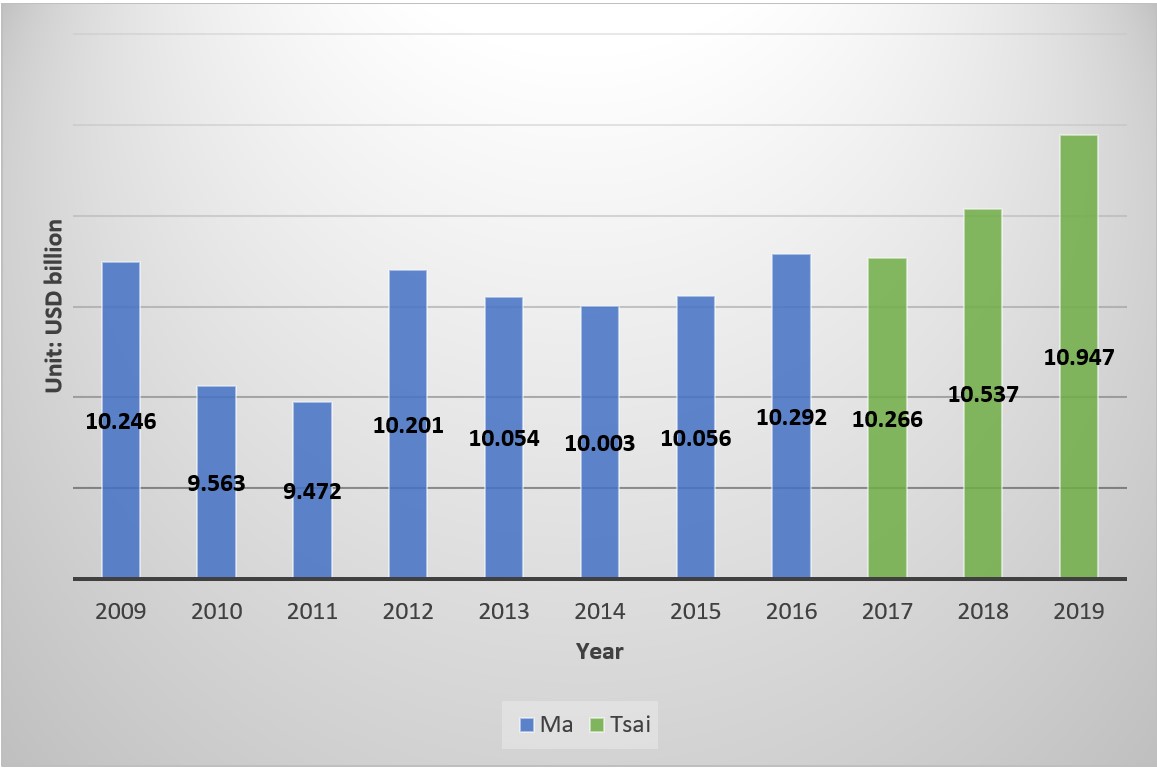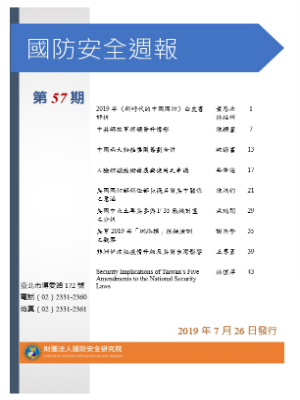第57期
Security Implications of Taiwan’s Five Amendments to the National Security Laws
I. News Focus
On July 3, 2019, the amendment to the Act Governing Relations between the People of the Taiwan Area and the Mainland Area (兩岸人民關係條例AGRPTAMA) was passed by the Legislative Yuan of Taiwan, which bars retired senior officers, including those with a previous rank of major general or higher, and deputy ministers with prior access to classified government information, from participating in political activities organized by the People’s Republic of China (PRC), completing the last piece of the five amendments to the national security laws of Taiwan that aim to curb the PRC’s influence and infiltration in Taiwanese society. Those who violate the law could be stripped of their entire pensions or receive a fine of up to NTD 10 million (USD 311,000).[1] As of July 17, amendments regarding the registration of the PRC’s agents in Taiwan (中共代理人法), along the same vein as the US Foreign Agents Registration Act, so as to prevent representatives of the PRC government from conducting activities in Taiwan that risk national security, are still under discussion.[2]
II. Security Implications
1. Assuring loyalty to Taiwan
In the category of assuring loyalty to Taiwan, there is the May 7 amendment to the Criminal Code, which serves mainly to expand the scope of the offenses against the external security of the state to include the PRC, Hong Kong, and Macao, thereby filling in gaps which had resulted in inability to severely punish the Chinese Communist espionage. Of the amendments to the AGRPTAMA, in addition to the July 3 amendment imposing restrictions on retired senior officers, the amendment passed on May 31 can be placed in the category of assuring loyalty as well. The May 31 amendment explicitly requires that, when a government representative is negotiating a political agreement between the two sides of the Taiwan Strait, this agreement must be submitted to the “double review” by the Legislative Yuan before negotiation and after signing, and must be approved by a national referendum. The threshold of political negotiation between Taiwan and the PRC has thus been significantly raised.[3]
2. Protecting national security information and intelligence
The amendments to the Classified National Security Information Protection Act (CNSIPA) and the National Security Act (NSA) are the laws to protect information from leaking to the PRC and to prevent the PRC’s agents from gathering intelligence in Taiwan. The amendment to the CNSIPA, besides requiring retired and resigned personnel who had access to secrets to be placed on restriction to leave Taiwan for at least three years and up to six years, clearly stipulates that if secrets are leaked to foreign adversaries such as the PRC, it will be punishable by imprisonment for more than three years and less than ten years. The punishment for leakage of absolute secrets can be aggravated by one-half, and the death penalty may be applied for wartime leakage. The amendment to the NSA extends the breadth of national security to cover cyberspace. The national security organs may investigate and punish cyberattack cases and have also greatly increased the criminal responsibility for the offenses of developing organizations for foreign adversaries. Anyone who develops organizations which may be utilized to gather intelligence for the Chinese Communists may be sentenced to more than seven years in prison and fined for less than NTD 100 million (USD 3,110,000). If military and public education personnel become involved in the Chinese Communist espionage cases, they will lose their rights to apply for monthly pensions, and those who have been paid will be required to return the pensions.[4]
Table: Summary of 2019 Taiwan’s Five Amendments to the National Security Laws (國安五法)
|
Date
|
Act amended
|
Implication
|
|
May 7
|
Classified National Security Information Protection Act
|
Protecting national security information & intelligence
|
|
May 7
|
Criminal Code
|
Assuring loyalty to Taiwan
|
|
May 31
|
Act Governing Relations between the People of the Taiwan Area & the Mainland Area (when negotiating a political agreement)
|
Assuring loyalty to Taiwan
|
|
June 19
|
National Security Act
|
Protecting national security information & intelligence
|
|
July 3
|
Act Governing Relations between the People of the Taiwan Area & the Mainland Area (restrictions on retired senior officers)
|
Assuring loyalty to Taiwan
|
Source: Compiled by Catherine K. Lin from public sources.
3. Taiwan-US mutual trust enhanced
By passing the five amendments to the national security laws, Taiwan-US mutual trust in integrity of knowledge about material shared with Taiwan has been greatly enhanced. It can be argued that partly due to this enhancement of mutual trust, the US arms sales of Stinger missiles (portable) and M1A2T Abrams tanks and their related equipment and support, worth about USD 2.2 billion, were consequently approved by the US State Department on July 8, 2019.[5] More and better US arms sales to Taiwan, along with US-Taiwan technological cooperation and transfers, and strategic intelligence sharing, are expected to follow.
III. Trend Analysis
1. Taiwan-US security partnership will be augmented
Due to the passing of the five amendments and the boost of Taiwan-US mutual trust, a Taiwan-US security partnership will be augmented. The content of the security partnership will include continuing arms sales and cooperation in areas such as humanitarian assistance, information security, and high technology (5G), among others, which should help to secure a stable and safe Indo-Pacific region.
2. Taiwan’s self-defense and defense of democracy will be strengthened
By amending the five national security laws, the avoidance of treason and rise of Taiwanese patriotism are encouraged by the Taiwanese leadership which will strengthen Taiwan’s self-defense and defense of democracy. Taiwan’s annual defense budget is expected to increase two percent each year with voters’ support. The chart below shows Taiwan’s annual defense budget from 2009 to 2019.
Figure: Taiwan’s Defense Budget 2009-2019
Source: Directorate-General of Budget, Accounting and Statistics, Executive Yuan, R.O.C. (Taiwan)
[1] Kuei-Hsiang Wen, “After the Completion of the Five Amendments to the National Security Laws, President: We Will Work on Amending Laws to Restrict the PRC’s Agents in the Next Session,” Central News Agency, July 5, 2019, https://tinyurl.com/y2gl5vlp ; Hsin-Po Huang, “Ker Chien-Ming: The Last Puzzle to the Five Amendments to the National Security Laws Is Completed,” Liberty Times, July 4, 2019, https://news.ltn.com.tw/news/politics/paper/1300739
[2] Peng-Ta Shen, “Public Opinion Divided on the PRC’s Agents Registration Act, Scholars: The Government Should Strengthen Publicity,” Central News Agency, July 17, 2019, https://tinyurl.com/y52kcg9p . The five amendments to the national security laws intend to protect Taiwan from the PRC’s influence and infiltration. These include amendments to the Criminal Code (刑法) and the Classified National Security Information Protection Act (國家機密保護法) passed on May 7, amendments to the AGRPTAMA passed on May 31, and then again, as mentioned above, on July 3, and an amendment to the National Security Act (國家安全法) passed on June 19. These five amendments can be divided into two categories of assuring loyalty to Taiwan and protecting national security information and intelligence.
[3] Hsin-Po Huang, “Ker Chien-Ming: The Last Puzzle to the Five Amendments to the National Security Laws Is Completed,” Liberty Times, July 4, 2019, https://tinyurl.com/y4z5jbr5
[4] Ibid. See table for concise summary.
[5] Defense Security Cooperation Agency, “Taipei Economic and Cultural Representative Office in the United States (TECRO) – Stinger Missiles and Related Equipment and Support,” July 8, 2019, https://www.dsca.mil/major-arms-sales/taipei-economic-and-cultural-representative-office-united-states-tecro-stinger ; Defense Security Cooperation Agency, “Taipei Economic and Cultural Representative Office in the United States (TECRO) – M1A2T Abrams Tanks and Related Equipment and Support,” July 8, 2019, https://www.dsca.mil/major-arms-sales/taipei-economic-and-cultural-representative-office-united-states-tecro-m1a2t-abrams



